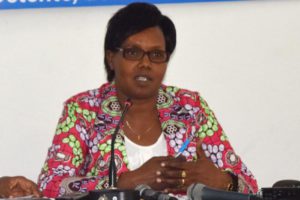Sexual and Gender-Based Violence (SGBV) remains a big concern in the Great Lakes region. The union of the Collectives of Women’s Associations of the Great Lakes Region (COCAFEM / GL) calls on member states of the region to become deeply involved in the fight against SGBV.

Therese Nijimana, the chairperson of COCAFEM / GL: “SGBV will be eradicated if all states are deeply involved in the fight against it”
The fight against Sexual and Gender –Based Violence-SGBV involves everyone. Victims of SGBVs need assistance and protection, Thérèse Nijimana, the chairperson of COCAFEM / GL told journalists on 30 August.
The Great Lakes Region member countries adopted the Kampala SGBV Declaration in 2011. “SGBV will be eradicated if all states are firmly involved in the fight against it,” said Nijinama.
She said that despite efforts of governments and NGOs to fight against SGBV, the latter continues. “The number of SGBV victims is still high in Burundi,” said Nijinama.
Ambassador Eliane Berthe Mokodopo, Program Officer of Gender, Women and Children at International Conference of the Great Lakes Region (ICGLR), said no government admits that SGBV is perpetrated in its country.
“If governments do not recognize that cases of SGBV still occur, how will they deal with them?” she wondered.
Nijinama deplores the fact that many Burundians do not know the law on the fight against SGBV. “Based on the interviews we conducted with them, some women victims of SGBV do not know where to go to seek justice” Nijinama said.
For this, she called on journalists to help raise awareness of the texts on the fight against SGBV. “COCAFEM asks journalists to offer a media space for SGBV,” she said.
She called on the Government of Burundi to implement effectively the Kampala Declaration on SGBV adopted in 2011 and UN Security Council Resolution 1325.
COCAFEM is made of 11 collectives of Women’s Associations of the Great Lakes Region, including 3 collective associations from Burundi, 5 from DRC and 3 from Rwanda. It was created in 2001 when human rights, especially women and children’s rights, were flagrantly violated due to crises the Great Lakes region was going through at the time.
Women decided to join forces to defend their rights and advocate for the end of violence against them.



















 IWACU Open Data
IWACU Open Data

